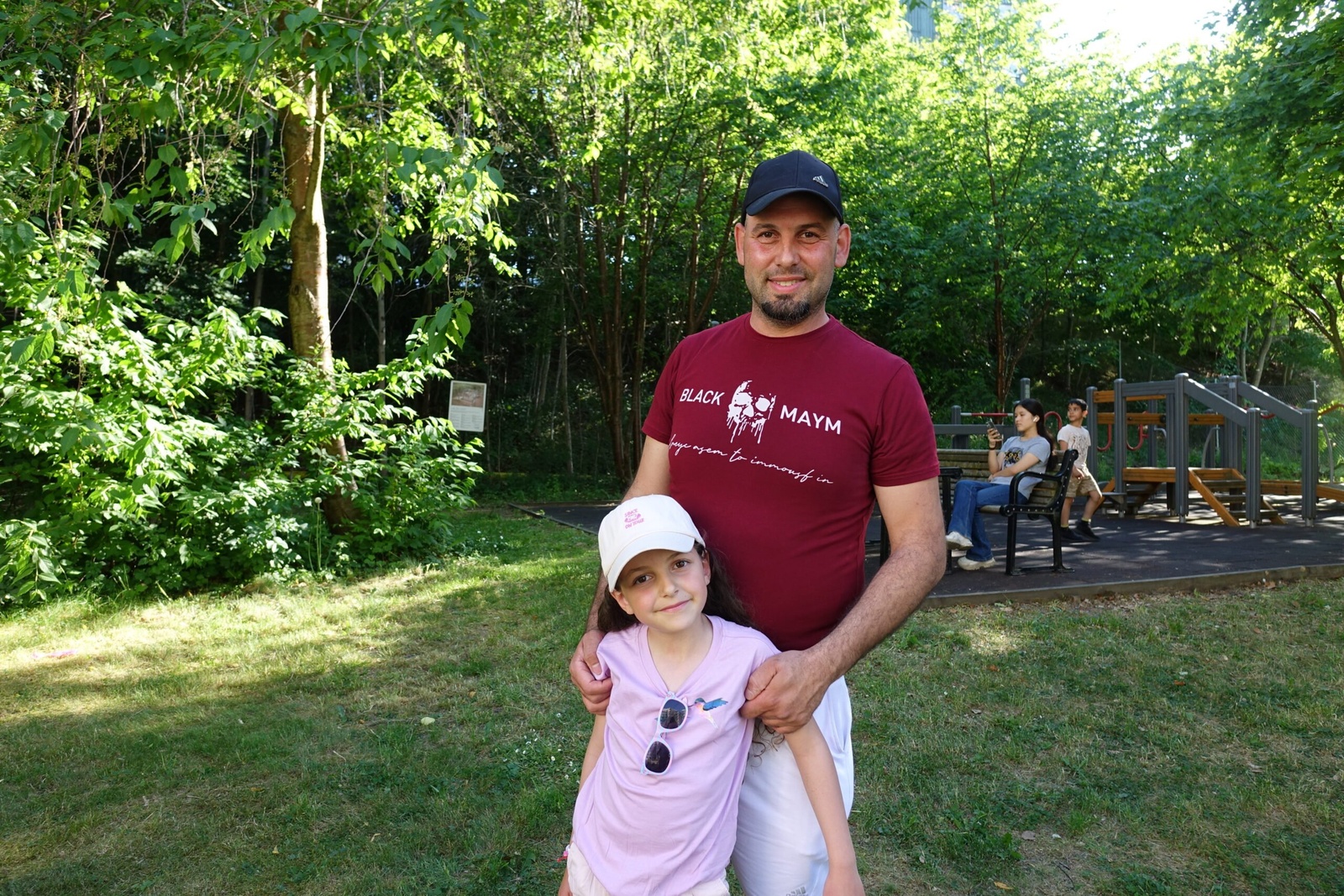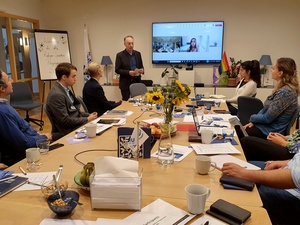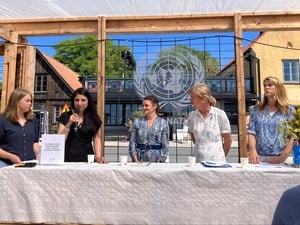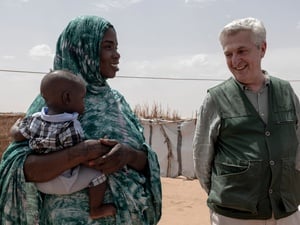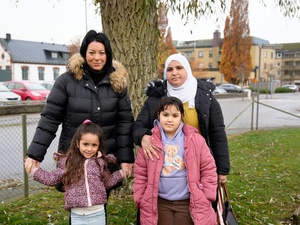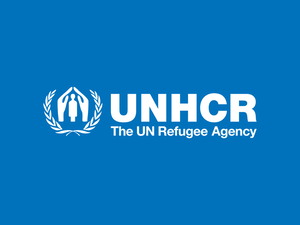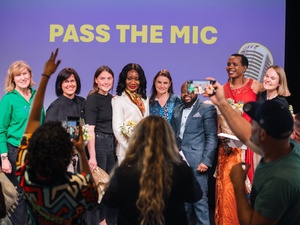“Integration can be mutually beneficial – both for the refugees, and for the locals”

“Integration can be mutually beneficial – both for the refugees, and for the locals”
With a wide smile, Charmante Kasaniroza greets everyone arriving. At Mötesplatsen in Danderyd, where the municipality is hosting a traditional Swedish Midsummer celebration for refugees and their welcome guides, more and more families are gathering. People from across the world are greeting each other, chit-chatting. Some help themselves to traditional midsummer food, while others attempt to keep track of their children as they dart around the lawn.
Originally from Rwanda, Charmante Kasaniroza was forced to flee to Uganda and ended up in a refugee camp. Two and half years ago, she and her family were resettled to Sweden via UNHCR, the UN Refugee Agency. She now works for Danderyd municipality, who – as the first in Sweden – has launched a pilot community sponsorship programme.
The aim of the project is to help facilitate a successful integration, and for refugees, who have been settled in the municipality, to gain access to their new local society. Refugees are matched with local volunteers who serve as welcome guides, to supplement the integration work done by the municipality.
“It’s wonderful. I wish it had been in place two years ago, when I had just recently arrived here. Swedes are not the most social bunch,” says Charmante Kasaniroza with a laugh, “… and that’s why I think this project is so beneficial, both for the refugees, but also for the local families.”
While community sponsorship programmes have been an integral component in the integration strategies of countries like Canada for decades and have slowly begun to spread out in Europe in recent years, the idea has made little headway in Sweden – until now.
In January, Danderyd Municipality, north of Stockholm, launched the pilot project in cooperation with the local NGO En Utsträckt Hand. The project is supported by UNHCR, the UN Refugee Agency, and runs with funding from the Stockholm County Administrative Board. The plan is to match 50 refugees during the pilot, which is set to run until March 2024.
While other municipalities have now received funding for similar projects, Danderyd was the first place in Sweden to initiate a community sponsorship program like this – unsurprising, given the nature of the municipality, according to project manager Johanna Larsson:
“Our local civil society is very strong here in Danderyd. Furthermore, there has been a thorough focus on integration from our local politicians for a long time, giving us a strong mandate to start integration projects like this one. It hasn’t been up and running for long, but already, three other municipalities and even more have reached out to us.”
Amanuel Beyene also works as a coordinator for the project. He himself came to Sweden as a refugee from Eritrea four years ago, and he recalls the value of a local network, not least in connection with finding a job and entering the labor market:
“When I arrived here, I was able to find a welcome guide through unofficial channels. This was extremely helpful for me and allowed me to integrate into Swedish society much quicker than I could have done otherwise. It helped me to avoid different cultural faux pas at my workplace when I was hired by Danderyd Municipality, for example”.
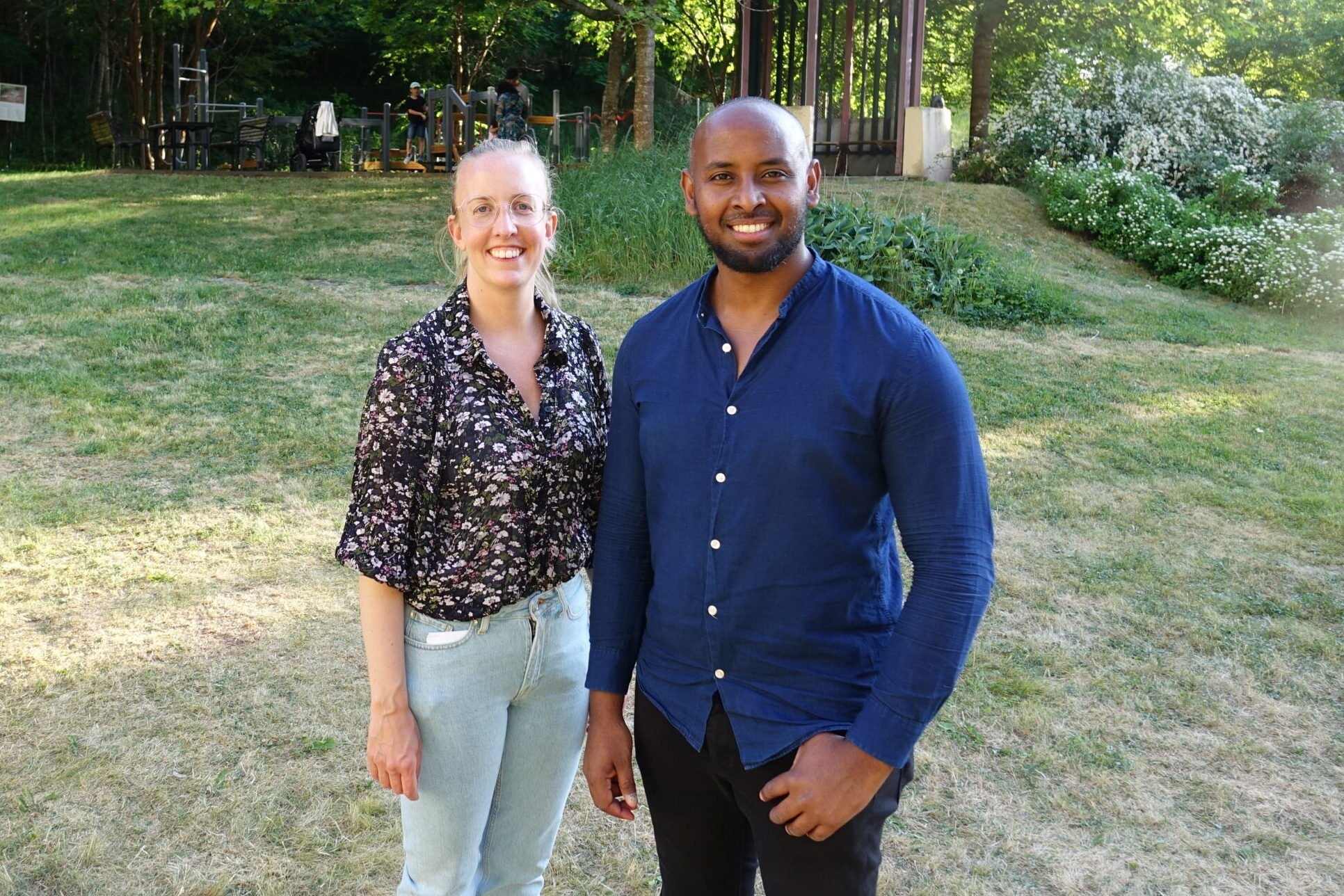
Johanna Larsson & Amanuel Beyene. © UNHCR / Mikael Bjuremalm
Syrian Omar Fatayri arrived in Sweden six months ago from Lebanon with his wife and daughter. He is looking for work as an electrician but acknowledges that it will be difficult to find a job, before completing his language courses.
“I had heard so much about Sweden from my friends before coming here, and I love being here. In Lebanon, people would say bad things about Syrians, but here, people are much nicer. Swedish food is nice, there are also many Arab restaurants for when I feel homesick,” he says. ”I have found a football team to play for, and the weather is also perfect. Well, at least during summer.”
At the event at Mötesplatsen, the midsummer buffet is impressive, with a mixture of cold cuts, salmon, different salads, pie, Swedish flatbread, as well as hot dogs and burgers. The sounds of Middle Eastern music coming from the speakers is suddenly interrupted when a band arrives and starts performing the classic Swedish dance-around-the-maypole Midsummer songs. Hearing this, a large number of kids quickly head for the dance area.

Young and old alike dance around the maypole at the Danderyd Midsummer celebration. © UNHCR/Mikael Bjuremalm
Coordinator Amanuel Beyene announces that a refugee family who arrived in Danderyd the previous night is set to be introduced to their welcome guide shortly. Anna Niregård, the new welcome guide, has come to the celebration with her two sons, and they are set to be matched with the new refugee family.
“Taking part in this project sounded like a good idea, as I know that integrating into Swedish society can be difficult for newly arrived refugees. I think it can be mutually beneficial, too. I heard that the refugee family also has children, so hopefully they can become friends with my sons”, she says.
The family who was just relocated to Danderyd the day before – Ako Ghafoor, his wife Hawnaz, and their children Leo and Nare – are originally from Slemani in Iraqi Kurdistan.
“I was working as an accountant back home, and my wife was working in retail. We had to flee due to the war and ended up making our way to Turkey. From there, we went by boat to Greece, and then, we travelled through Europe until finally making it to Sweden,” explains Ako Ghafoor.
After the first introductions, Anna asks Ako if he knew anything about Sweden before coming here?
“Well, I knew that there is a good government here and a fair judicial system. I also knew that Sweden has a king and a Prime Minister, and that the country hasn’t been at war for over 200 years. So, I knew a little bit about the place I was going to,” Ako says with a smile, leaving Anna impressed.
The trio start discussing the differences between Swedish and Kurdish cuisine. As the families prepare to gather their children for a group photo, the three boys dart off and climb a tree in the garden.
As the band packs up and goes home, the table is being cleared. The Niregård and Ghafoor families eventually manage to gather their children for the photo, and the Swedish maypole circle dance has transitioned into a Middle Eastern dabke dance. The music eventually fades out, and the guests start making their way home. The project manager and coordinator from Danderyd municipality finally exhale, happy with the course of the night. “This has been hard work, but very fun,” says Johanna Larsson, “and I think it’s been a great success”.
Erika Löfgren, Senior Durable Solutions Associate at UNHCR, explains why community sponsorship programmes are so important:
“UNHCR has been actively advocating for community sponsorship programmes. Human encounters are key to physical and psychological well-being, and can lead to a stronger sense of inclusion and belonging, which can facilitate faster integration into society and a better understanding for the situation of refugees. We hope the Danderyd initative will inspire other municipalities”.



